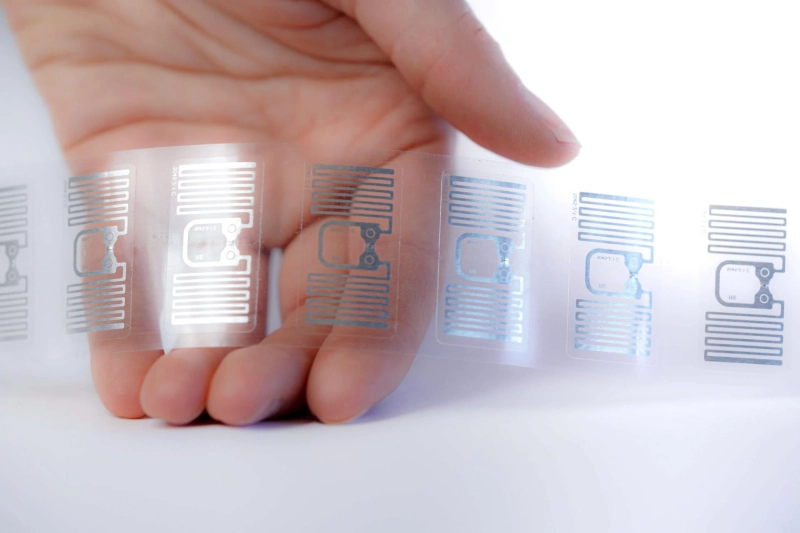In the intricate dance of modern logistics, asset management, and consumer interactions, RFID (Radio Frequency Identification) labels have emerged as a cornerstone technology. They seamlessly blend the physical and digital realms, enabling efficient tracking, management, and analysis of diverse assets. From simple supply chain operations to sophisticated consumer engagement strategies, RFID labels are constantly evolving, driven by technological advances and innovative applications. This post delves into the technological advancements and future trends shaping the world of RFID labels.
Understanding RFID Labels
RFID labels, often referred to simply as RFID tags, consisting of a microchip attached to an antenna, encapsulated in a protective material. These labels can be embedded in or attached to an object, allowing for automatic identification and tracking via radio waves. RFID systems typically comprise three components: the RFID tag (label), the RFID reader, and the backend database that collects and processes the data.
Technological Advancements in RFID Labels
- Enhanced Memory and Processing Power: Traditionally, RFID labels stored minimal information, often limited to an identification number. Recent advancements have seen an increase in the storage capacity and processing power of these tags. With improved memory, RFID labels can now store detailed product information, history logs, and even small programs that perform specific functions such as condition monitoring.
- Miniaturization: As technology progresses, the size of RFID chips has significantly decreased. This miniaturization is pivotal for applications requiring discreet or embedded tagging. Smaller RFID chips mean that labels can be integrated seamlessly into a plethora of objects, from clothing items to tiny medical devices.
- Increased Read Range and Speed: Innovations in RFID antennae design and reader sensitivity have contributed to extended read ranges and faster reading speeds. This development is crucial for applications in large warehouses, retail stores, or manufacturing plants where quick and accurate scanning of RFID tags from significant distances is required.
- Improved Durability: New materials and encapsulation techniques have bolstered the durability of RFID labels. Tags can now withstand harsh environmental conditions, including extreme temperatures, moisture, and physical stress. This robust design expands the applicability of RFID in challenging environments such as outdoor asset tracking, agricultural management, and industrial operations.
- Security Enhancements: The security of RFID systems has always been a concern due to potential risks including data interception and unauthorized scanning. Recent advancements focus on encryption methods and authentication protocols to ensure secure data transmission. These measures help prevent unauthorized access and cloning, making RFID systems more secure for critical applications.
- Integration with IoT (Internet of Things): RFID technology is increasingly intertwined with the IoT ecosystem. Smart RFID labels can communicate with IoT platforms, enabling real-time data analytics and decision-making processes. This integration facilitates advanced applications like condition-based monitoring, predictive maintenance, and automated inventory management.
Future Trends in RFID Labels
- Widespread Adoption in Retail and eCommerce: The retail sector continues to be a major adopter of RFID technology. Future trends point to a more ubiquitous integration of RFID labels for inventory management, loss prevention, and enhanced customer experiences. For instance, RFID-enabled stores could allow customers to skip traditional checkouts and automatically charge their account upon leaving with RFID-tagged items.
- Expansion in Healthcare: Healthcare is poised for significant RFID adoption. RFID labels could revolutionize patient management, asset tracking within hospitals, and drug authentication processes. Future trends include embedding RFID tags in patient wristbands, medical devices, and pharmaceuticals to improve accuracy, safety, and traceability.
- Evolution in Supply Chain Management: The logistics and supply chain industry is likely to see deeper integration of RFID technology, from raw material sourcing to last-mile delivery. Advanced RFID labels could enable end-to-end visibility of goods, optimize inventory levels, reduce waste, and enhance overall supply chain efficiency through real-time data sharing and predictive analytics.
- Enhanced Consumer Engagement: RFID labels hold promise for enriching consumer engagement. NFC (Near Field Communication) tags, a subset of RFID, can be incorporated into product packaging, enabling consumers to access detailed product information, traceability data, and personalized experiences via their smartphones. This trend will likely evolve into more interactive and immersive consumer-brand relationships.
- Sustainability and Recycling: Sustainability is becoming a critical focus across industries. Future RFID label innovations will emphasize eco-friendly designs, including the use of biodegradable materials and energy-harvesting capabilities. Furthermore, RFID technology could enhance recycling processes by providing precise information about the materials and components of tagged items, facilitating more effective sorting and processing.
- Advanced Data Integration and AI: The convergence of RFID with AI and machine learning technologies will spearhead new applications and efficiencies. For example, AI algorithms could leverage RFID-generated data for predictive analytics, identifying patterns and trends that inform strategic business decisions. This synergy will unlock new potential in areas such as personalized marketing, streamlined manufacturing processes, and in-depth customer insights.
Conclusion
RFID labels, a powerful tool in the realm of automatic identification and data capture, are continuously evolving. Current technological advancements enhance their memory, durability, and integrative capabilities with IoT platforms, paving the way for exciting future trends. As we move forward, the prospects of RFID technology signal transformative impacts across retail, healthcare, supply chain management, consumer engagement, and sustainability practices.
Understanding and embracing these advancements not only prepares businesses and industries to leverage RFID for current needs but also positions them to capitalize on emerging trends. The future of RFID labels promises a more connected, efficient, and intelligent world, where the line between the physical and digital continues to blur, creating opportunities for innovation and growth.
Source of this article:
https://en.wikipedia.org/wiki/Radio-frequency_identification


